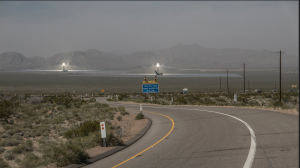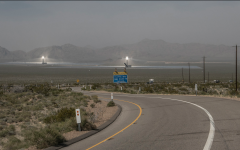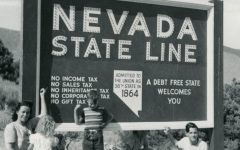
Diablo Canyon Nuclear Power Plant. (SMT)
OPINION: Nevada has overcommitted to solar and wind projects
On Earth Day, Think Globally (Outside The Box), Act Locally
By Ron Knecht, April 22, 2022 12:08 pm
Friday is Earth Day. So, between its “think globally, act locally” spirit and my long familiarity with energy, water, land-use and public policy matters, some thoughts (non-partisan and driven by science, economics and sound regulation) on Nevada and Western resource and environmental problems.
Southwestern water problems are currently most acute, whether seen as caused merely by long-term climate cycles or due also to human-caused warming. The Colorado River basin, including the Southwest and part of Mexico, is experiencing its worst long-term drought in many centuries. So, our water problems are mainly supply-side challenges; maybe permanent, maybe short-term.
But with the surfaces of Lakes Mead and Powell, the Colorado and US’s two largest reservoirs, sinking toward levels where they can’t provide water or power, we can’t be optimistic for reversal of the mega-drought any time soon. Some parts of the Southwest, including Clark County, have done well attacking the problem from the demand side. There are even projects that desalinate sea water in California to free up some Colorado-basin water for inland states such as Nevada.
We need more such projects. But that’s not enough. While potable southwest groundwater is limited, there’s much more non-potable groundwater that could be desalinated for use. Even that’s not enough. Within the Southwest, we need also to consider water law reform and marketing to end irrigation of alfalfa and other low-value uses and shift water to high-value urban and industrial uses. Even that may not be enough with the continuing growth of the area’s population.
Ultimately, the engineering or supply-side solution may need to extend to moving water from the Mississippi and Missouri valleys, America’s water surplus areas, over the Rockies to the Colorado basin. But water is rather heavy and moving it over mountains requires significant energy. So, this and many other water projects are costly.

That brings us to the energy problem, especially electric power. Nevada and other states have overcommitted to solar and wind projects that are expensive, cannot meet our electric energy needs, and degrade the reliability of our grids. They also bring significant environmental, resource and decommissioning waste problems that will take years to solve.
For various reasons, we don’t want to go back to using more coal and oil generation, plentiful as they are.
Natural gas may provide an economic, reliable, generally clean bridge to the future, especially because much gas-fired generating capacity already exists. But as I pointed out previously, the real solution to providing reliable, secure, clean and reasonably economic electric power is to revive the nuclear option. Starting with not closing California’s Diablo Canyon plant.
As an expert witness on power generating economics, especially nuclear, I have small partial credit helping stop a dozen nuclear units from 1975 to 1995. Ultimately, I came to understand that the reason they were uneconomic was that mal-regulation drove up their costs hugely – namely requiring uneconomic safety, environmental and health standards and extensive retrofit to satisfy them. If we correct these two problems, I believe fission can again be economic.
Further, new nuclear technologies, especially small modular reactors, show great promise.
What, besides state and federal regulatory reform, is needed to secure the Southwest’s energy future and thus its water future? Let’s not kid ourselves. All this will be expensive.
And it doesn’t solve the long-standing land-ownership problem of 84 percent of Nevada’s lands and extensive portions of lands in other southwestern states being held by the federal government. This has long denied our states needed economic growth and tax revenues.
So, another big piece of the solution is for the federal government to return significant portions of that land to the states – those areas that do not have major environmental and preservation value, are not costly to own, and can be economically developed. East of the Rockies, very little land in the states is owned by the feds, so such return is only a matter of fairness and sound public policy.
Further fairness and sound policy would involve partial federal funding of the nuclear plants. Especially in Nevada, they should provide such funding, including full funding for nuclear fuel reprocessing, thus requiring only modest levels of storage of waste products at Yucca Mountain.
The engineering, environmental, economic, financial and regulatory problems will be daunting. But even more so the political problems, as illustrated by a century of seven states and recently Mexico trying to solve water and power problems under the Colorado River Compact. Reaching over the Rockies would add 15 more states, from Montana to Wisconsin, Mississippi, Louisiana, Kansas and everywhere between. Some of them would be water source states.
But we’re addressing critical major problems here, and piecemeal efforts have made little impact. It’s time to front all these major challenges with an outside-the-box, integrated, big-picture approach.
- Supreme Court Got It Just Right on Race Preferences - July 3, 2023
- OPINION: Nevada has overcommitted to solar and wind projects - April 22, 2022
- Opinion: Critical Race Theory Lies and People Who Tell Them - November 22, 2021





only a fool thinks nuclear power is “clean”, the people that have lived in this part of the country for the last 70 years have heard that lie over and over again.
thats why we fought yucca mountain, the waste is one of the worst toxins ever produced by man